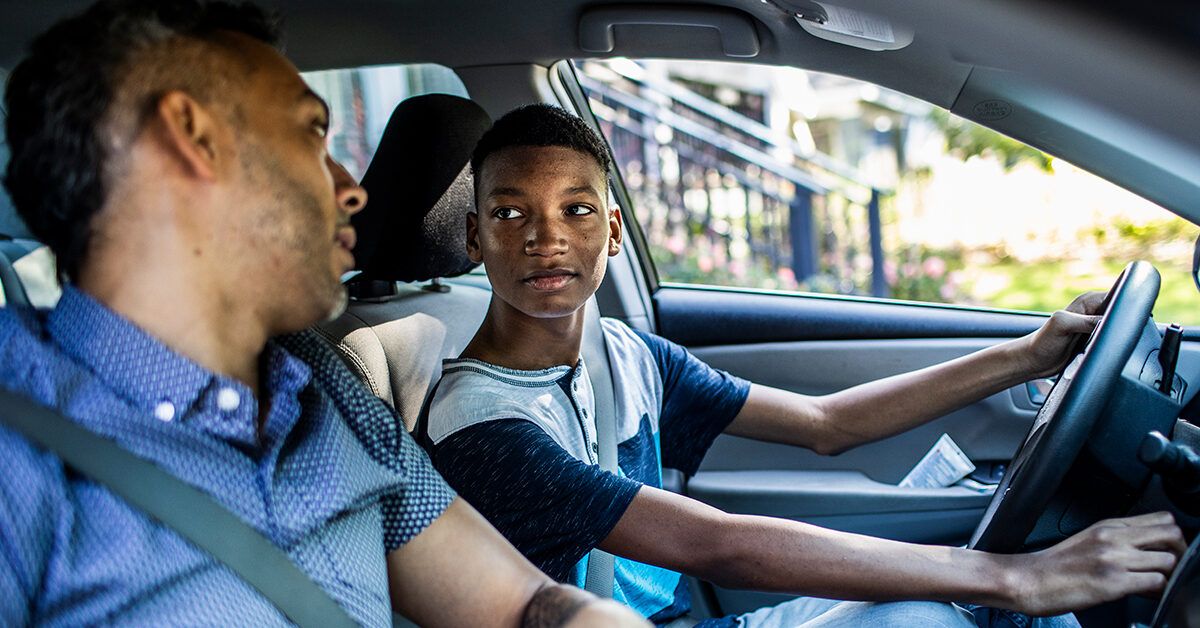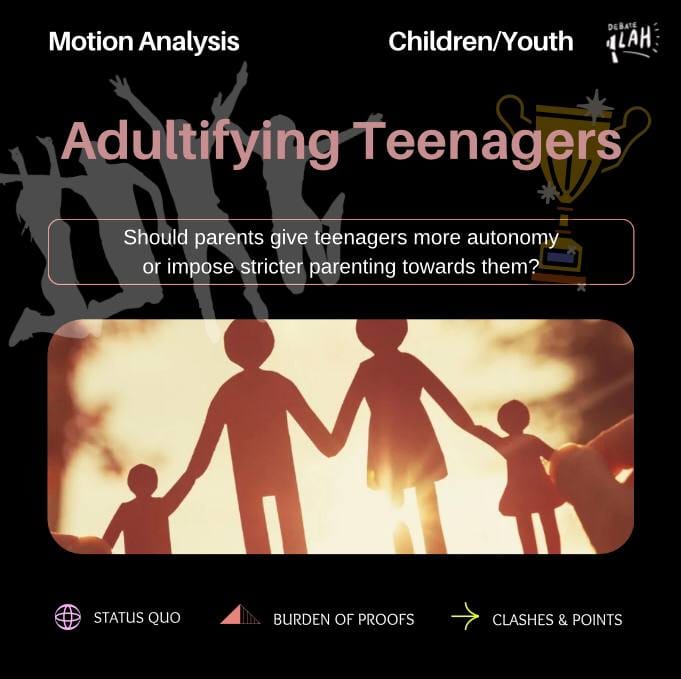Parenting Teenagers
Parenting is a challenging task. The most constructive parenting styles often don’t come naturally, therefore a lot of work has to be put in by a parent to ensure their child is raised in the best way possible. With that being said, throughout most of the past, most parents tend to implement a stricter parenting model (usually a mix of authoritarian and authoritative styles) believing that it is the best way to protect and prepare their children for the future. However in recent years, especially in Western culture, we’ve seen the rise of more permissive parenting styles, with parents allowing their children more autonomy and freedom and rarely using disciplinary measures. Instead, this permissive parenting style often allows children to figure things out for themselves, with parents often adopting a friendship-type relationship with their children. This leads us to the question of whether the freedom and autonomy given to these children/teenagers (from the permissive parenting style) is beneficial for them. Does it prepare them better for the future and help them develop healthily in mind and body? Or will it cause them to be influenced by their recklessness and rebel further against their parents? With these questions unanswered, let us give you our analysis and argumentation on the motion:
This house prefers parenting models that adultify teenagers (i.e. giving them more responsibilities and autonomy, assuming higher capacity for independence) to those which emphasize their status and treatment as teenagers (i.e. refraining from giving them adult responsibilities, emphasizing they are legal minors).
This motion encourages debaters to think about what sort of parenting model is better for shaping well-prepared teenagers for the future. Let us know which parenting model you prefer or what parenting model you think is more common amongst your peers!
Status Quo: Do teenagers have a high capacity for independence?
Traditionally, parents have always been strict with their children for many reasons. The main one is that they do it out of love to protect their children and better them for the future. However, in recent years, we have seen a rise in permissive and more lenient parenting models because people have argued that strict parenting models, especially those with a more authoritarian style, cause a lot of problems within families.
By switching to these more lenient and permissive parenting models, children/teenagers will gain more autonomy and significantly have much more room to navigate through life themselves giving them more room to grow, with parents acting as a best friend and support system for their child rather than actively interfering with their child’s decision. However, along with this permissive parenting model, children/teenagers might actively rebel more and develop risk-prone temperaments as without proper boundaries, children may approach certain situations without fear or trepidation, which can increase their chances of engaging in risky behavior such as substance abuse and develop bad habits.
Proponents state that in the world, there is a mix of both adultification with more autonomy and strict traditional parenting models. However, the adultification parenting model they are proposing is gaining more prominence despite society being more accustomed to viewing teenagers as irrational and that parents know what is better for their children than the children themselves do.
Opponents state that currently, teenagers are already viewed as capable of shouldering some degree of responsibility, that's why in most cultures, it is common to see that teenagers are allowed to do certain things such as going out with friends at night or learning how to drive despite having punishments and curfews. Opponents also argue that Proposition's definition/characterization of the adultification model already aligns with the status quo (which opponents mentioned)
#1 Which side's parenting model can better family relationships?
Proponents argue that on their side, the burden of strained family relationships can be lessened as parents are more likely to communicate maturely with their children rather than patronize them as opposed to the opposition side where the parents don't communicate with their children as they believe their children are incapable of making rational decisions for major life issues. This is because the adultification model on the proponent's side looks like a general guidance framework in which the parents generally give more freedom and autonomy to teenagers whilst still advising and communicating with them on how to navigate life/responsibilities. For example, teenagers are going through a lot of mental and physical changes, therefore they have to change and mature their desires. On the proposition's side, parents do not limit these desires and instead allow them to make these risky decisions/mistakes and act on their desires in a safe environment or engage in a mature dialogue with them on why acting on certain desires is bad for them and listen to their children on an equal level rather than completely disregarding their children's opinion and forcing their views on the children thus mitigating the risk of children being rebellious and of long term friction and damages in the family relationship.
Opponents say that proposition neglects the underlying reason teenagers are rebellious; unfairness because it is a fundamental feeling that is especially acute in children as people often contrast their life experiences with other possible burdens. Opponents state that in their world, they eliminate this perception of unfairness because most parents won’t give their children a lot of autonomy anyway (i.e. won’t let them go out late at night /drinking/partying) therefore mitigating said unfairness and reducing the risks of teenagers being rebellious and resenting their parents in the first place as they will not compare themselves to their peers and even if resentment does occur towards the parents, the children will be well protected and that any resentment the children will have will diffuse as they grow older and mature enough to understand why their parents impose so many restrictions. In addition to that, proponents state parents on their side will also communicate with their children as all parents have the incentive to explain themselves because they want to maintain a healthy and good relationship with their children.
#2 Which side better prepares teenagers for the future?
Proponents propose that their model better prepares teenagers for the future because in their model, responsibilities are introduced gradually to teenagers, as opposed to it being suddenly thrust onto teenagers once they leave the house. Proponents also agree that on both sides of the house, all parents want is for their children to be well prepared for the future however, they argue that their method does this best because teenagers will know how to manage and handle themselves better due to teenagers building good habits (i.e. managing their finance or cooking for themselves) over the long term as they have been given the autonomy to do it before. In addition, they also wouldn’t need their parents to motivate and scrutinize them to do certain things like studying and being responsible, thus making them much more independent.
Opponents think that their model does a much better job of preparing teenagers for the future. This is because they believe that the proponent's mechanism is non-unique because it is already happening in the status quo. Opposition states that in their world, they can prepare children better. Parents can instill good habits in their children on a subconscious level because parents can advise their teenagers and enforce said advice over and over again (i.e. in spending, parents can tell their children how to spend money and what they should prioritize buying) as opposed to side propositions where teenagers will not listen to their parents (due to the culture of independence that has been created leading the parent’s words to be discounted) and instead develop mistakes within their habits. When it comes to approaching adulthood, developing mental schema is extremely important, and opposition argues that this is better done on their side because parents enforce small habits and customs within their teenagers over a long period of time.
#3 Who looks after the well-being of teenagers better?
Proponents claim that in their world, the well-being of teenagers is better protected. The main reason for this is that on their side, even if teenagers make mistakes with drastic consequences (i.e. teenage pregnancy), the teenagers can communicate about it with their parents and seek the help they need instead of internalizing their problem because they are scared of their parents. In addition to that, teenagers won’t have to carry the emotional baggage caused by conflicts and resentment towards their parents because their parents make the effort to communicate with them and make them feel understood and respected.
Opponents state that in their case, teenagers are much more shielded from the complexities of adulthood and mental trauma. This is because opposition believes that adultifying teenagers not only means exposing them to the joys and freedom of adulthood but also to the burdens of it. Opposition argues that in proposition's world, parents are more likely to be frank about these burdens with their children because it is a key part of a parent's own adult experience (i.e. exposing their children to marriage problems or financial burdens) and this can add immense stress to teenagers but in their world, teenagers are much more protected from this mental trauma of growing up too fast because their parents are overprotective out of love and treat these teenagers as teenagers (spares them from the sobering conversations of adulthood).
Burden of Proofs
After understanding the parental models suggested by both ends, it’s your turn to evaluate whether each side has provided sufficient proof and analysis to support their stance.
Proponents should prove why giving teenagers more autonomy and freedom is overall beneficial for the teenager and family.
Opponents should prove why imposing stricter parenting is the better option.
Do you think parents giving teenagers more autonomy and responsibilities better prepare them for the future? Or will this autonomy feed into teenage impulsiveness and endanger them?
That was an informative read!
Here's a document that summarises all you need to know about understanding both ends of the topic at hand.
These parenting models and their impacts require extensive research to understand and tackle, so we’ve linked some relevant resources below to get you started!
- Benefits and risks of strict parenting

- Permissive parenting

Hats off to Team Hong Kong and Team Singapore of WSDC 2022 for the awesome debate!
Author: Ayla Georgia (@aylageorgia_ on Instagram)



